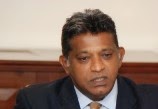 |
| Dr. Saravanamuttu |
I am acutely aware of all of this through the experience of my own country where even after the end of a protracted thirty-year war, the sources of conflict are not being addressed but rather sustained and even reproduced. The annual resolutions in the Council on Sri Lanka since 2012, attest to this. Consequently movement towards a post-conflict situation with meaningful reconciliation and national unity is impeded. In particular, the cancer of impunity in respect of disappearances and detentions, extra-judicial killings and torture, corrodes public faith and confidence in the agencies of the state, especially in the impartiality of the executive, the effectiveness of the legislature and the independence of the judiciary – the key elements of democratic governance.
Moreover, for the sustenance and stability of non- violent international relations, it is of crucial importance that governments meet their obligations that arise from common membership of the international community, obligations that complement rights and which are enshrined in a number of conventions and declarations of the United Nations. The gains wrought by generations of activists, opinion and policy-makers in gaining acceptance and adoption of in turn, generations of human rights as fundamental to international relations must not be reversed. The United Nations, through the Special Mechanisms of the Council, has a special responsibility to ensure that states uphold the very values and principles in their internal governance, which they agree to and endorse in their international relations. Raison d’etat and the imperatives of the national security state and its anti- terrorist doctrine must not be allowed to ride roughshod over the classic, liberal understanding of the raison d’etre of the state in the first instance as protector, provider and partner, facilitating an enabling environment for the realization of human potential rather than as a predator in respect of fundamental rights and freedoms.
Arbitrary detention, unrestrained by reference to international human rights instruments and the rule of law, goes to the heart of the challenge of democratic governance in the twenty-first century. Rooted as it is in a narrow notion of the obligation of the citizen to the higher authority of the state, it strikes directly at the rights of the person. It leads to hopelessness and despair of the victims and their families, as the best years of their lives are lost to suffering and uncertainty. It sustains conflict and democratic deficit perniciously eroding both the legitimacy and legality of the state.
I firmly believe in the roles and responsibilities of the Special Procedures and Mechanisms of the UN Human Rights Council in facilitating and defending the enjoyment of human rights for all the peoples of the world. I believe too that my demonstrable commitment to human rights throughout my career and the experience and expertise I have obtained, equip me to make a contribution at this level of international relations and human rights protection.